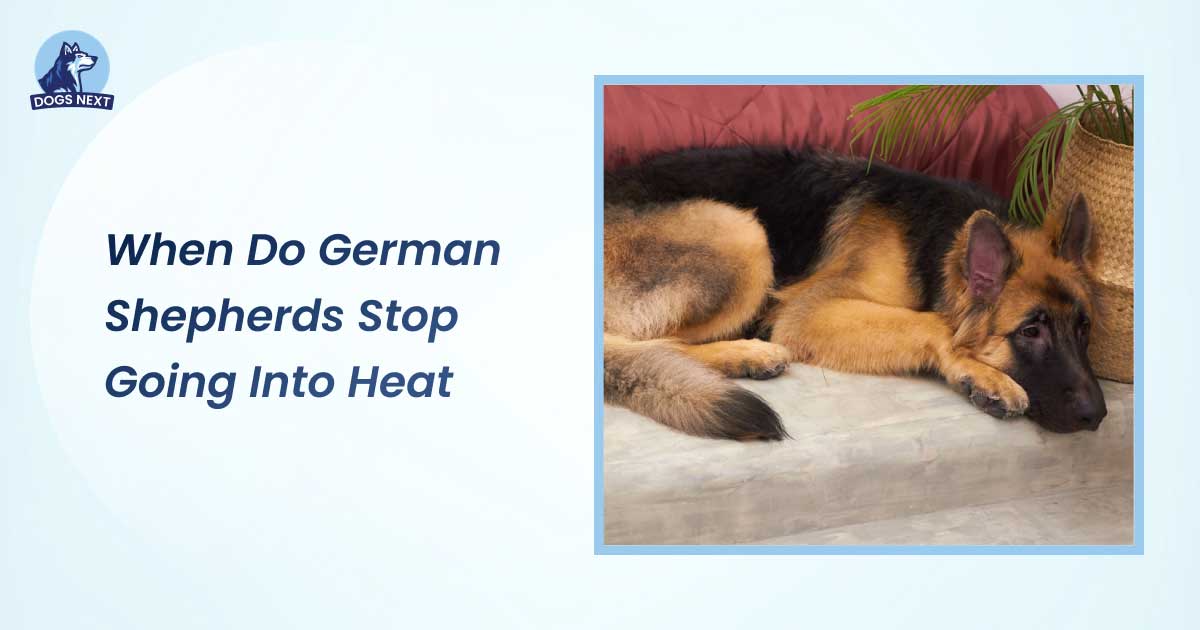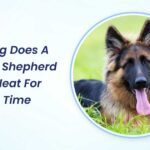German Shepherds typically stop going into heat around 8 to 10 years old. This can vary based on individual health and genetics.
German Shepherds experience their first heat cycle between 6 to 12 months of age. Heat cycles typically occur every 6 months and last about 2 to 3 weeks. As they age, the frequency and intensity of these cycles may decrease.
By 8 to 10 years old, many German Shepherds stop going into heat altogether. It’s essential to monitor your dog’s health and consult with a veterinarian for personalized advice. Proper care ensures your German Shepherd remains healthy and comfortable during these cycles. Understanding their reproductive cycle helps in planning for breeding, spaying, or managing any health concerns.
Typical Age Of Heat Cessation
Understanding when German Shepherds stop going into heat is crucial for owners. The typical age of heat cessation varies among breeds. For German Shepherds, knowing the heat cycle age helps in planning their care. Let’s explore when these loyal companions usually stop having heat cycles and what factors influence this.
At What Age Female German Shepherds Stop Going Into Heat
Female German Shepherds typically experience heat cycles throughout their lives. However, the frequency and intensity may reduce as they age. German Shepherds usually stop having regular heat cycles between the ages of 7 to 9 years.
Several factors influence the dog heat cessation age, including:
- Health: Chronic health issues can affect the heat cycle.
- Diet: Proper nutrition supports reproductive health.
- Genetics: Breeding history plays a role in heat cycle patterns.
Here’s a simple table to summarize the general age range:
| Age (Years) | Heat Cycle Pattern |
|---|---|
| 1-2 | Regular heat cycles, every 6 months |
| 3-6 | Consistent heat cycles, every 6-8 months |
| 7-9 | Irregular heat cycles, may stop entirely |
Owners should monitor their German Shepherds’ heat cycle age and consult a vet if irregularities occur. Understanding these patterns ensures better care and health management for your furry friend.
The Reproductive Age And Menopause In Dogs
Unlike humans, dogs do not experience menopause. Instead, their reproductive capabilities diminish over time. Female German Shepherds can technically go into heat throughout their lives, but the cycles become less frequent and may eventually stop.
Here’s what happens during the aging process:
- Reduced Frequency: Heat cycles occur less often as the dog ages.
- Lower Fertility: Older German Shepherds have reduced fertility rates.
- Health Concerns: Older dogs may face health issues affecting their heat cycles.
Owners should be aware of signs indicating the end of regular heat cycles:
- Longer intervals between cycles.
- Less pronounced symptoms of heat.
- Behavioral changes and reduced interest in mating.
Understanding the dog heat cessation age helps in planning for their senior years. Proper care, a balanced diet, and regular vet check-ups are essential for a healthy life. Monitoring the German Shepherd heat cycle age ensures they receive the best care throughout their lives.
Signs Your Dog Is Nearing The End Of Heat Cycles
German Shepherds, like other dogs, experience heat cycles that signify their reproductive periods. As they age, these cycles change and eventually stop. Recognizing the signs your dog is nearing the end of heat cycles can help you care for your aging pet more effectively.
Changes In Behavior
One of the first signs of heat cycle end in German Shepherds is a noticeable change in their behavior. Older dogs may become less interested in mating activities and display a calmer demeanor. Look for the following behavioral changes:
- Reduced interest in roaming and seeking mates
- Less frequent marking of territory
- Decreased restlessness and anxiety
- More time spent resting or sleeping
These changes can be subtle but are often consistent. Your dog may also show more affection towards you, as their focus shifts from reproductive activities to seeking comfort and companionship. It’s essential to monitor these behaviors to ensure they align with the natural aging process and not underlying health issues.
Physical Symptoms As They Age
Aging German Shepherds exhibit various physical symptoms indicating the end of their heat cycles. These symptoms can range from changes in their reproductive organs to overall health declines. Key signs include:
- Irregular or absent heat cycles: Heat cycles become less frequent or stop altogether.
- Changes in vulva appearance: The vulva may appear less swollen and return to a more normal size.
- Reduced discharge: Vaginal discharge, a common sign of heat, diminishes significantly or ceases.
- General health decline: Older dogs may experience joint pain, reduced mobility, and weight changes.
These aging dog reproductive signs are natural as your German Shepherd transitions out of their reproductive years. Regular veterinary check-ups are crucial to ensure these symptoms are part of the aging process and not indicative of other health concerns.
Differences In Heat Cycles For Senior Dogs
Senior German Shepherds experience different heat cycles compared to their younger counterparts. The changes are often gradual but noticeable. Differences include:
| Aspect | Young German Shepherd | Senior German Shepherd |
|---|---|---|
| Cycle Frequency | Every 6-8 months | Irregular or absent |
| Duration | 2-4 weeks | Shorter or non-existent |
| Behavioral Signs | Restlessness, seeking mates | Calmer, less interest in mating |
| Physical Signs | Swollen vulva, discharge | Normal vulva size, no discharge |
Understanding these dog menopause signs helps in caring for your aging pet. Senior dogs may also face other health issues, so it’s vital to maintain a close relationship with your vet to address any concerns promptly.
Managing Older Dogs In Heat
Managing Older Dogs in Heat is crucial for the well-being of senior German Shepherds. As dogs age, their heat cycles can become more challenging to handle. Here, we will delve into Tips for caring for older German Shepherds and Health considerations to ensure you can effectively manage your aging furry companion.
Tips For Caring For Older German Shepherds
When caring for dogs in heat, it’s essential to provide them with a comfortable and stress-free environment. Here are some practical tips for senior dog heat cycle management:
- Monitor your older German Shepherds in heat closely for any signs of discomfort or unusual behavior.
- Ensure they have access to clean water at all times to stay hydrated during their heat cycle.
- Offer regular walks and exercise to keep them active and maintain their overall health.
Health Considerations
As older German Shepherds go through their heat cycles, certain health considerations need to be taken into account. To effectively manage dog heat cycles in seniors, it’s important to:
- Consult with your veterinarian to discuss any specific health concerns related to your older German Shepherds in heat.
- Keep a close eye on their diet and ensure they are getting the necessary nutrients to support their aging bodies during this period.
- Provide extra care and attention to their grooming needs to keep them clean and comfortable throughout their heat cycle.
Frequently Asked Questions
When Do German Shepherds Stop Going Into Heat?
German Shepherds typically stop going into heat around 6 to 12 years of age. The frequency of heat cycles may decrease as they get older.
How Often Do German Shepherds Go Into Heat?
German Shepherds usually go into heat every six months. However, this can vary depending on the individual dog.
What Age Do German Shepherds First Go Into Heat?
German Shepherds usually have their first heat cycle between 6 to 12 months of age. This can vary slightly.
How Long Does A German Shepherd’s Heat Cycle Last?
A German Shepherd’s heat cycle typically lasts about 3 weeks. This includes the proestrus, estrus, and diestrus phases.
Conclusion
Understanding when German Shepherds stop going into heat helps in their care. Typically, they go into heat until they are spayed or reach old age. Regular veterinary check-ups are essential for monitoring their health. Always consult with a vet for personalized advice regarding your German Shepherd’s reproductive health.

I’m David, an expert contributor and writer, with two furry friends of my own, I know the challenges of raising and caring for dogs. From training to nutrition and health, my goal is to provide valuable insights and advice to help create strong bonds and happy, healthy lives. Find me in Twitter.




